I’ll try not to duplicate material from the other posts here. What I have tried to do is give you a play by play of what it was like to go on a "away mission" off the Mercy and into a foreign country to see patients under the protection and supervision of the US Navy. I’ve put pictures and descriptive words to help you see the sights and hear the sounds. My experience is ideal for this because I was at one of the most remote locations. This was, literally a seaside village of a few thousand people.
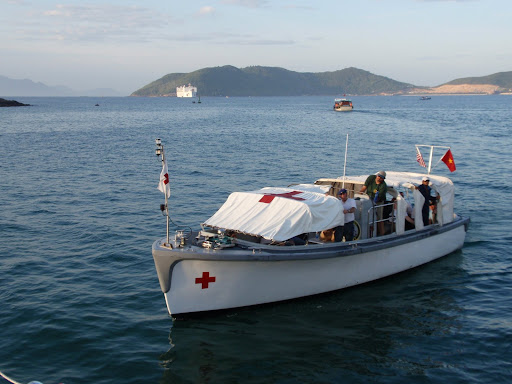
It’s my first day off the ship… finally! Up at 5am. The water is rough as I climb
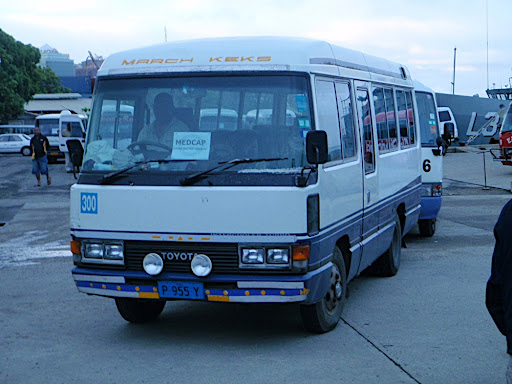
aboard the band-aid 20-person boat (shown at left). On shore we open up the storage lockers and load our pallet of supplies onto two pickup trucks. Then we climb aboard 2 buses (shown right) and caravan our way to a seaside town 40 minutes away. Our team is composed of 20 or so healthcare providers: doctors, nurses, dentists, physical therapists, and military hospital corspmen along with a 10-person security force complete with guns in hand.
Soon we are in town. The houses are approximately 20x20 feet, and all are built up on the second floor. My best guess is that this is because of termites because even the hilltop ones are built like this so it can’t be on account of the rain. They are made of wood and tin. All have cooking pits on the ground beneath them. (That explains all the burns we have been seeing.) There is a great deal of excitement and bustle as we ride in. Kids run up to the buses in the street yelling and cheering. Everyone waves. There is a lot of cheering and a general feeling of excitement hangs in the air.
all are built up on the second floor. My best guess is that this is because of termites because even the hilltop ones are built like this so it can’t be on account of the rain. They are made of wood and tin. All have cooking pits on the ground beneath them. (That explains all the burns we have been seeing.) There is a great deal of excitement and bustle as we ride in. Kids run up to the buses in the street yelling and cheering. Everyone waves. There is a lot of cheering and a general feeling of excitement hangs in the air.
Our clinic today is the open-air first floor beneath a church. We exit 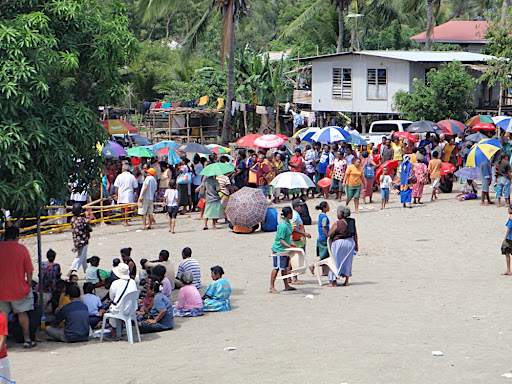 the bus and start setting up
the bus and start setting up  shop while a man with a loudspeaker gives a grandiose speech first in the native language and then in English. After hearing stories of thousands of people lined up I am surprised that we have just a small crowd of maybe 100. I wonder if we will have enough business for the day. My intuition turns out to be wrong as we have a steady stream for the next 3 days. There is a small wire fence around the church basement, and all around are the houses of the village.
shop while a man with a loudspeaker gives a grandiose speech first in the native language and then in English. After hearing stories of thousands of people lined up I am surprised that we have just a small crowd of maybe 100. I wonder if we will have enough business for the day. My intuition turns out to be wrong as we have a steady stream for the next 3 days. There is a small wire fence around the church basement, and all around are the houses of the village.
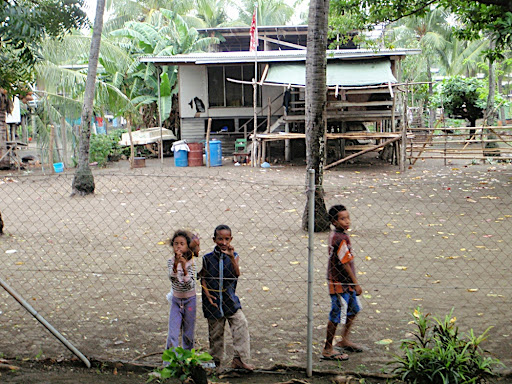 Children are playing and peering through from the fence. Small, scrappy dogs are running around. When I take out my camera, all the children cry out to get my attention. They perform antics and make funny poses trying to get me to take a picture of them. I see what I think is a mosquito and immediately slap on my REI bug juice. Malaria, which is transmitted by a bite from a mosquito, is endemic here.
Children are playing and peering through from the fence. Small, scrappy dogs are running around. When I take out my camera, all the children cry out to get my attention. They perform antics and make funny poses trying to get me to take a picture of them. I see what I think is a mosquito and immediately slap on my REI bug juice. Malaria, which is transmitted by a bite from a mosquito, is endemic here.
I am excited but also nervous. I get one of the “provider” spots at a table, with an experienced doc right next to me in case I need to solicit any advice. She is a dermatologist, an indispensable resource for this situation due to the abundance of skin complaints. She flies through patients. Interviewing, diagnosing, explaining, prescribing, and then sending them off as she yells “next patient.” I get off to a slow start. I do everything I’ve been taught. I smile as I introduce myself. I ask lots of questions. All this is done through a local man who is serving as a translator and so the process takes lots of time. I am glad to have my dermatologist for backup.
Soon I realize that this isn’t the same breed of medicine that I am used to seeing in the US. My job is to find the truly sick people and do what I can to help them out. If someone sounds like they have TB, I tell them adamantly that they need to get treatment at one of the free clinics on the island. If I think they have malaria, HIV, or are pregnant they get tested by our lab and receive an answer on the spot.
At least two-thirds of my patients are there for back pain. It’s no surprise 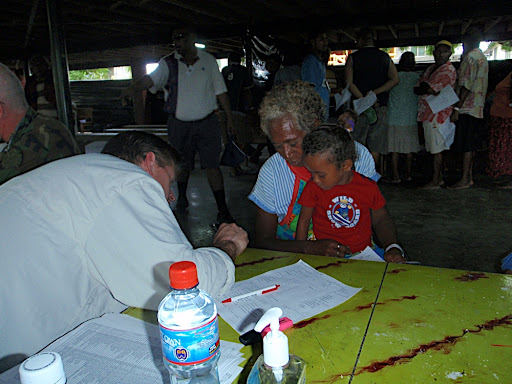 given that the women carry huge jugs of water atop their heads from wells and streams back to their homes, and men go out and gather firewood and return with it on their backs. I give the “low back pain” lecture countless times. Keep your back straight when you bend down. Use your knees to lift the weight. Stretch your hamstrings. Keep your stomach muscles strong. Don’t work so hard. Wear shoes when you have to walk long distances. I warn them to stop using Motrin if they have stomach pain. (A well-known side effect of that drug is stomach ulcers, something Vioxx tried to fix but that caused other problems.)
given that the women carry huge jugs of water atop their heads from wells and streams back to their homes, and men go out and gather firewood and return with it on their backs. I give the “low back pain” lecture countless times. Keep your back straight when you bend down. Use your knees to lift the weight. Stretch your hamstrings. Keep your stomach muscles strong. Don’t work so hard. Wear shoes when you have to walk long distances. I warn them to stop using Motrin if they have stomach pain. (A well-known side effect of that drug is stomach ulcers, something Vioxx tried to fix but that caused other problems.)
I am surprised that almost all the patients are happy at the end of the encounter. They thank me graciously, even when I have to conclude with “I’m sorry that we can’t do more for you.” It’s a very different experience than treating people in the US.
And so I make it through my first day, having seeing fewer than half as many patients as the dermatologist at my table. Then it’s back onto the buses, a caravan back to the port, and a ferry boat onto the Mercy. I eat a ton of food for dinner and immediately go to bed.
--pete
 It’s my first day off the ship… finally! Up at 5am. The water is rough as I climb
It’s my first day off the ship… finally! Up at 5am. The water is rough as I climb 
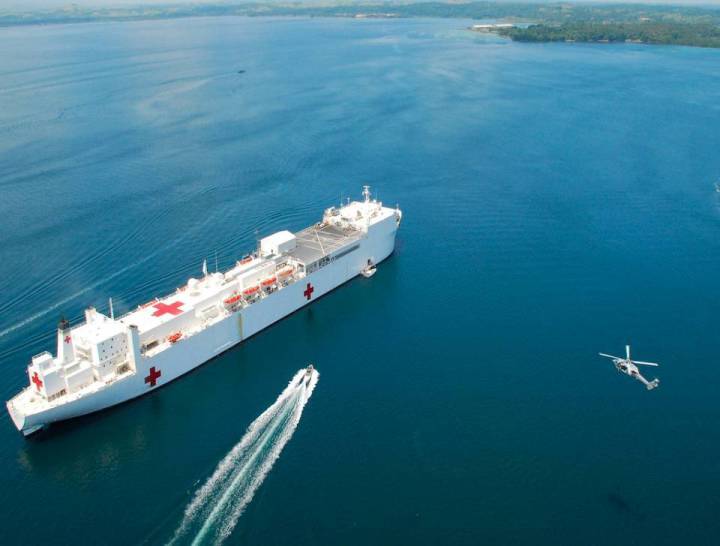


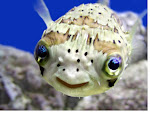



No comments:
Post a Comment